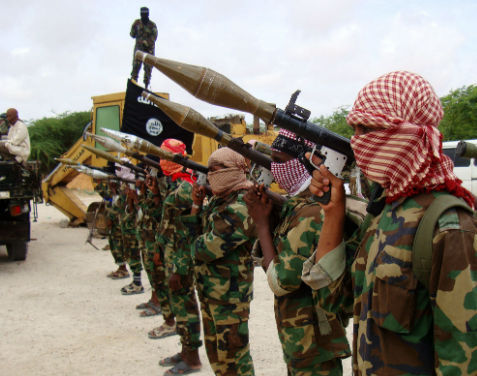Hollow victory
- BY Zhao Jinglun
 0 Comment(s)
0 Comment(s) Print
Print E-mail China.org.cn, August 13, 2013
E-mail China.org.cn, August 13, 2013
When the founder of al Qaeda Osama bin Laden was killed on May 2, 2011 by American special forces in Abbottabad, Pakistan, the Americans were jubilant: Al Qaeda had been decapitated! Barack Obama has been celebrating ever since.
|
|
|
Al-Qaeda in the Arabian Peninsula (AQAP) is generally considered the most active of the al Qaeda's "franchises." [File photo] |
On October 24, 2012, Obama told a campaign rally: "Al Qaeda is on the path to defeat. And Osama bin Laden is dead." A few days later on November 2, he declared: "Al Qaeda has been decimated." Then on January 14, 2013, he announced: "We've dealt devastating blows to al Qaeda."
In his major speech at the National Defense University in May, the president said: "Core al Qaeda is a shell of its former self. They did not direct the attacks in Benghazi, Libya or Boston." He added that their "remaining operatives spend more time thinking about their own safety than plotting against us."
If this is true, then why did his Department of State order the closing of scores of diplomatic offices? It was later disclosed that U.S. intelligence services overheard "chatter" indicating that , bin Laden's successor, the Egyptian doctor Ayman al-Zawahiri, had ordered Nasir al-Wuhayshi, the leader of al Qaeda in the Arabian Peninsula(AQAP), to launch massive attacks against American targets. But no target or date was specified. Al-Wuhayshi was bin Laden's personal secretary and has just been appointed as al-Zawahiri's deputy. These two authentic, core al Qaeda stalwarts have put Washington back on the defensive.
Al-Qaeda in the Arabian Peninsula (AQAP) is generally considered the most active of the al Qaeda's "franchises" which emerged as a result of the weakening of the group's central leadership. It operates in Saudi Arabia and Yemen, although now primarily in Yemen as Riyadh has suppressed its Saudi faction. Yemen was also bin Laden's ancestral home, as his father was born there.
As early as October 2000, even before the Saudi and Yemeni branches merged, al Qaeda shocked the world with its daring bombing of the USS Cole in the southern port of Aden, killing 17 U.S. sailors. In 2002, it attacked and damaged a French supertanker in the Gulf of Aden.
In the following years, it carried out attacks in Saudi Arabia, including the kidnapping and murder of Paul Johnson in Riyadh in 2004.
Umar Farouk Abdulmutallab, who made an unsuccessful attempt to bomb Northwest Airlines Flight 253 on Christmas Day 2009, was also sent by AQAP, which was only formally declared a terrorist organization by then U.S. Secretary of State Hillary Clinton 20 days prior to the failed attack.
On May 21, 2012, it engineered the deadliest attack in Yemeni history in which a suicide bomber killed 120 and wounded more than 200 among military personnel preparing for a parade rehearsal for Yemen's Unity Day.
There is also another franchise which is bearing the brunt of the fighting on the rebels' side on the Syrian battlefield and that is al Qaeda in Iraq (AQI), or Islamic State in Iraq and Greater Syria. The group was founded by Abu Musab al-Zarqawi, an Arab of Jordanian descent, who officially vowed obedience to bin Laden in October 2004. He was killed in an American air strike in June 2006 and his successor, Abu Ayyub al-Masri, was killed in April 2010 in an Iraqi government operation.
Awwad Ibrahim Ali al-Badri (aka abu Du'a) was then selected to lead AQI and he was officially designated a terrorist by the U.S. State Department in October 2011. Since the complete withdrawal of U.S. forces from Iraq in late 2011, AQI, mainly composed of Sunni fighters, has stepped up attacks against Shiite targets. It appears that a factional civil war is developing in Iraq.
Under pressure from Maliki's Shiite government, many AQI fighters have gone to fight in Syria and in April 2013, Abu Du'a announced a union with the other jihadist group, Jabhat al-Nusra, which was fighting in Syria before the arrival of AQI.
Under serious threat from AQAP, Washington has intensified drone strikes on the Yemeni militants and the strikes have killed a number of militants in Pakistan, Somalia and Yemen. But the drone tactic has also angered many Arabs and Muslims, creating more enemies.
Former Defense chief Donald Rumsfeld suggested a simple criterion for judging the success, or lack of it, in the fight against terrorism: Whether the U.S. has killed more terrorists or the religious schools have trained more new recruits. Using this standard, the United States is losing the anti-terror war as it (not the religious schools) is creating more militants than it is killing. Twelve years after 9/11 and America is still no safer.
The author is a columnist with China.org.cn. For more information please visit:
http://www.china.org.cn/opinion/zhaojinglun.htm
Opinion articles reflect the views of their authors, not necessarily those of China.org.cn.







Go to Forum >>0 Comment(s)